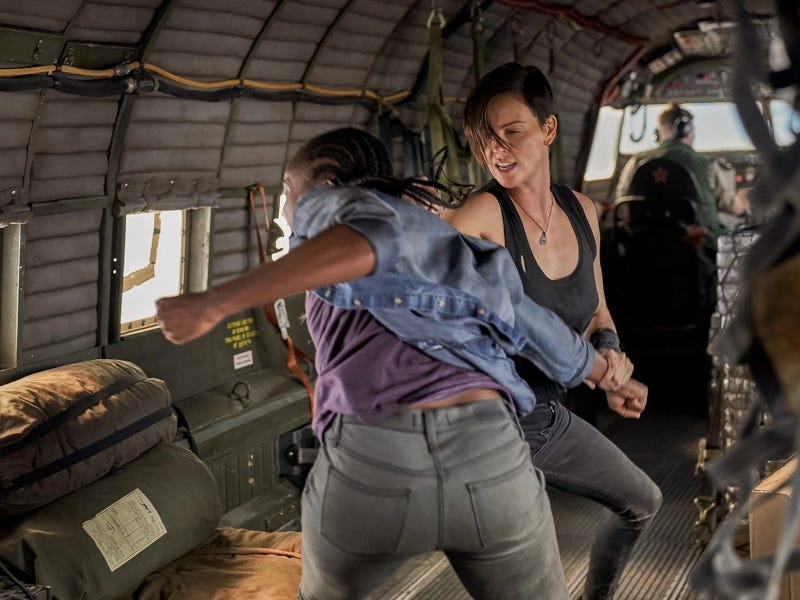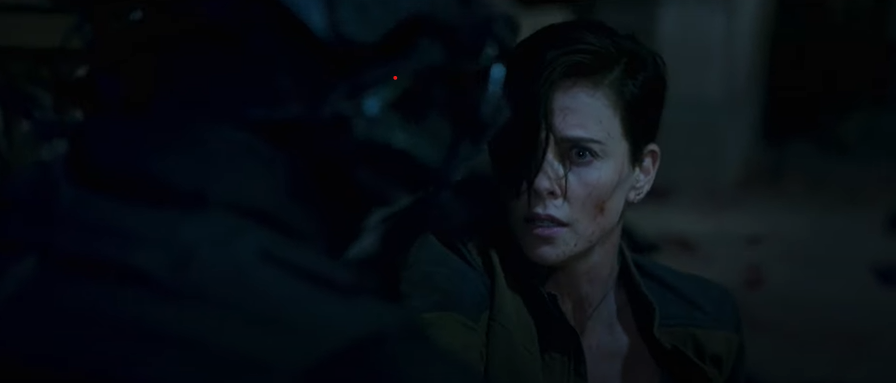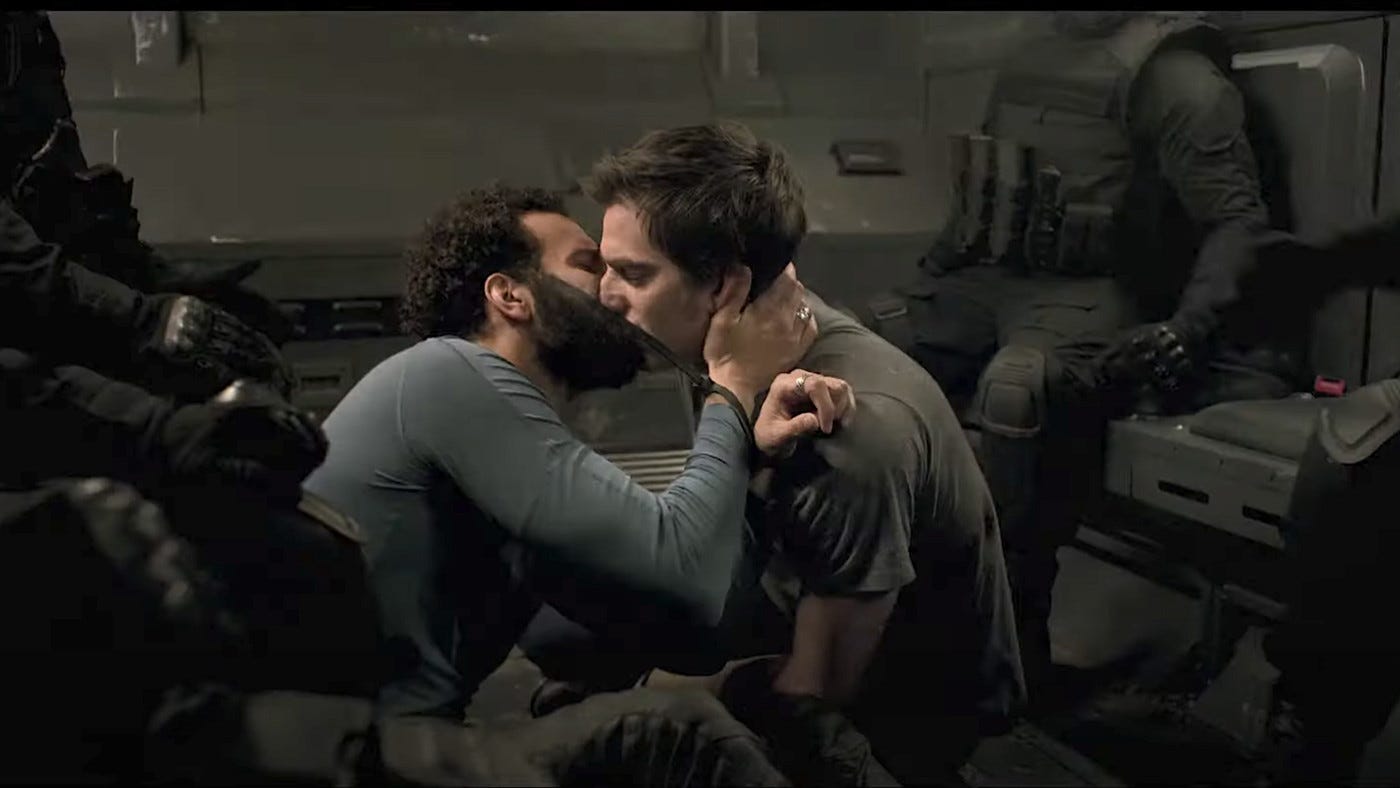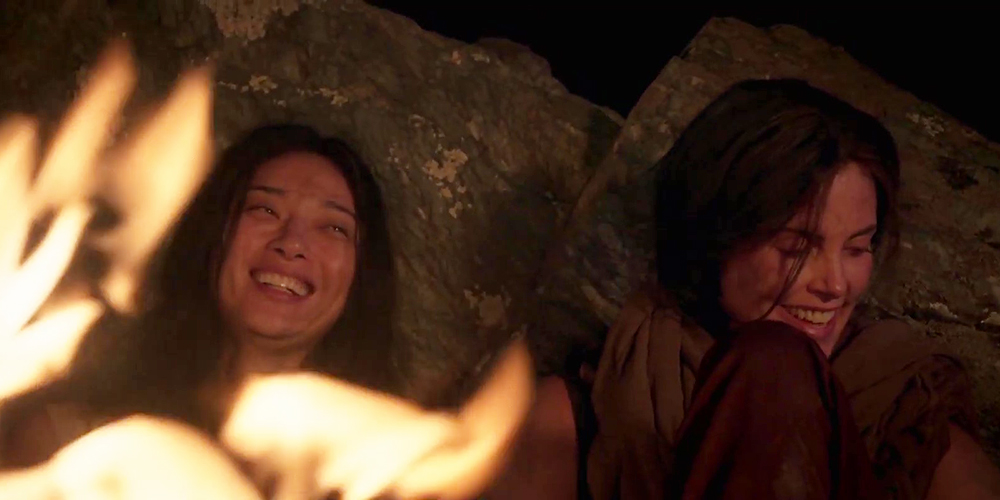(This article contains minor spoilers for The Old Guard.)
As a lover of action, sci-fi, and comic books, I often feel that I have to leave my identity at the door when I go to the movies. Genre films, particularly action films, tend to operate under the increasingly false assumption that straight white men make up most of their audience. Every time one of these movies casually objectifies women or uses LGBT people as the butt of a joke, I feel the sting of alienation. Whatever their intention, it feels like these directors are pausing the movie to look at me and say, “This isn’t for you.”
The Old Guard, therefore, comes as a breath of fresh air in a genre that so often ignores underrepresented voices. The film, adapted from a comic book series by Greg Rucka, follows a team of mercenaries with the ability to recover from grievous injuries and even death. Notably, and somewhat shockingly, The Old Guard is the first major comic book adaptation directed by a Black woman. Gina Prince-Bythewood more than rises to this groundbreaking challenge, and her experiences lend a much-needed perspective to a largely patriarchal and white-dominated genre.
A glance at the film’s cast list shows a diverse group of actors from traditionally underrepresented backgrounds. Marwan Kenzari plays Joe, a Muslim Tunisian man in an adoring relationship with his male partner, Nicky. Chiwetel Ejiofor delivers one of the film’s best performances as Copley, a morally complex widower who sees scientific promise in the immortals’ abilities.

But while the ensemble’s dynamics are crucial to the tone and the plot, The Old Guard is not an ensemble film. It focuses primarily on two women from radically different backgrounds: Andy, a woman of ambiguous European descent who’s lived so long that she no longer remembers her own age, and Nile, a young African American soldier who discovers her immortality when she survives a seemingly fatal injury during a mission in Afghanistan.
At the start of the film, Andy leads a team of three men who defer to her without question or resentment. It’s remarkable how utterly unremarkable her leadership role feels within the context of the story, to the point where it hardly struck me as noteworthy until Charlize Theron (who plays Andy) and Prince-Bythewood pointed it out in an interview. How many action movies show men following a woman’s orders, respecting her as not only an equal but an authority figure, and treating her gender as a non-issue?
Nile also breaks boundaries as a Black woman and co-protagonist. She’s the newest member of the immortals, so we experience much of the film through her eyes. As with Andy’s leadership position, the choice to center her perspective feels both radical and completely natural. KiKi Layne brings strength and sensitivity to the role, movingly communicating Nile’s confusion as she discovers her new powers and her sorrow at the prospect of outliving her family.

Despite her training as a Marine and her considerable prowess in battle, Nile expresses discomfort with violence and holds a deep reverence for human life. In a conversation with Andy, Nile reveals that a terrorist she shot at the beginning of the film was the first person she killed. Even though this man killed her in turn (albeit temporarily), she struggles with guilt over his death. She initially refuses to join Andy on her mission to rescue Joe and Nicky because she can’t imagine committing the large-scale acts of violence she’s witnessed Andy perpetuate. The film echoes Nile’s complicated relationship with violence. While the action sequences are thrilling and occasionally gory, The Old Guard takes a more nuanced approach to violence than most action films. Violence always serves a purpose, both in terms of the film’s structure and within the world of the film itself.
That being said, The Old Guard is not a pacifist film. For action junkies such as myself, there’s plenty to get excited about. From the first action sequence, I was blown away by the creative yet easy-to-follow fight choreography. The immortals fight with all the skill you’d expect from lifetimes of battle and every character’s fighting style aligns with their background. Nicky, who was once a crusader, wields a longsword in addition to a sniper rifle, while Joe uses a scimitar. Booker, a relatively recent addition to the team, relies more heavily on firearms.

Andy and Nile also get a chance to demonstrate their skills in one of the film’s best fights. They duke it out on a careening airplane with the kind of ferocity I’ve rarely witnessed in fight scenes between women. In an interview with NPR, Prince-Bythewood expressed her frustration with the way women often fight in action movies: “Whenever there’s a cool fight between two women, it always has to turn into this sexy catfight as opposed to just — these two women are warriors. Let them fight.”
And fight they do. Nile fights with a Marine’s resilience and tactical skill and lands enough hits on Andy to thoroughly impress her. Ultimately, though, she can’t overpower someone who’s lived through as much violence as Andy. As Booker later observes, Andy has “forgotten more ways to kill than entire armies will ever learn.” Her combat style incorporates elements from numerous martial arts disciplines, reflecting her thousands of years of experience. When Nile refuses to surrender, Andy ends the fight with a truly brutal beatdown. It’s the kind of heart-pumping, bone-crushing, no-holds-barred battle that action heroines have long been denied.
Prince-Bythewood also examines the psychological toll of violence in a way that many action directors don’t. Andy in particular seems weary of killing, as evidenced by a scene in which she singlehandedly takes out an entire SWAT team. It’s always a joy to watch Theron in action: the fight takes on an almost balletic tone as she dances through a church, dispatching one enemy after another in a fluid chain. However, Prince-Bythewood and Theron offset the scene’s beauty with a moment of raw grief. After Andy carves her way through the soldiers, the camera lingers on her agonized face. In this brief shot, Theron conveys the weight and trauma that her character bears after millennia of killing.

Conversely, the film has a few instances of gleefully cathartic violence. It’s hard not to cheer when Joe kills the man who gassed and shot his beloved Nicky, or when Nile tackles a smug and morally bankrupt CEO out of a window. By and large, though, The Old Guard treats violence as an unfortunate means to an end. The immortals aim to protect innocent lives, end injustice, and make the world a safer place. They often use violence to achieve these goals, but violence is not the goal in and of itself. Tellingly, the scene that best encapsulates The Old Guard’s philosophy is not an action sequence but a quiet moment between Andy and a good samaritan at a pharmacy. The film’s overarching message is one of compassion rather than aggression.
That compassion also shines through in the centuries-long romance between Joe and Nicky. The two men first encountered each other on opposite sides of a battlefield during the Crusades. They killed each other many times before becoming reluctant allies, then friends, and finally lovers. Even after spending several human lifespans together, they are clearly enamored with each other. The pair display their affection in every scene they appear in, from holding each other while they sleep to flirting over the dinner table. They react viscerally whenever their lover is injured or killed, despite knowing that any injury is temporary. Joe sums up his feelings for Nicky in a poetic rebuff to a soldier’s homophobia: “This man is more to me than you can dream. He’s the moon when I’m lost in darkness, and warmth when I shiver in cold. His kiss still thrills me even after a millennium. His heart overflows with a kindness of which this world is not worthy. I love this man beyond measure and reason. He’s not my boyfriend. He’s all, and he’s more.”

Their relationship is perhaps the film’s brightest spot of hope, showing that immortality doesn’t have to mean loneliness and misery. It’s also a huge leap forward for LGBT representation in the action genre. Much has already been written about Joe and Nicky’s groundbreaking romance, but it bears repeating: no other action franchise has meaningful LGBT representation. Most action franchises completely ignore the existence of LGBT people. Others, like Star Wars and Marvel, offer blink-and-you’ll-miss-it moments of representation and expect praise. So it’s hard to overstate the impact of two men openly, frequently, and joyfully expressing their love for each other in a movie like The Old Guard. As a gay person, I’ve never felt so respected by an action film.

The Old Guard also hints at the deep bond between Andy and Quynh, a former member of the team who met a horrific fate at the hands of witch hunters. Centuries after their separation, Andy still grieves the loss of her companion, and it’s implied that much of Andy’s trauma stems from this loss.
Quynh herself is another example of positive representation. Her comic-book counterpart is a Japanese woman named Noriko. When Vietnamese actress Ngô Thanh Vân accepted the role, she asked that the character’s name and background be changed to match her own, thus averting Hollywood’s unfortunate habit of treating Asian people as interchangeable.
Apart from the changes to her name and nationality, Quynh’s story generally lines up with Noriko’s. In the comics, however, Andy and Noriko’s relationship is explicitly romantic. It’s a little disappointing that their romance didn’t make it to the film, especially given how forthrightly the film portrays Joe and Nicky’s relationship.

However, if The Old Guard’s stinger scene is anything to go by, Quynh will feature much more prominently in a potential sequel. Prince-Bythewood has stated that she intends for The Old Guard to be the start of a trilogy, although Netflix has yet to confirm that a sequel is in the works. Hopefully, subsequent films will further explore the relationship between the two women — and, perhaps, give lesbian and bisexual women the joy of seeing themselves as heroes.
Regardless, The Old Guard is a massive triumph for representation in the action genre. It’s also one of the most entertaining action films I’ve seen in years. Despite checking all the boxes I look for in a summer blockbuster, the story never felt stale or clichéd. I attribute much of this freshness to the film’s representation. Putting diverse talent on both sides of the camera breathes new life into old conventions. More importantly, it tells every member of the audience that their stories have value. The Old Guard proves that action films can succeed not just despite but because of their diversity. The rest of the genre has no excuse not to follow suit.


Comments
One response to “We need more action movies like ‘The Old Guard’”